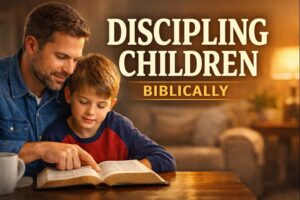⏱️ Estimated Reading Time: 7 min read
Whether you are coming out of the belief system where “apostles” and “prophets” with governing authority have been restored today, or you have a loved one or family member fully invested in the miracles, signs, wonders, and deliverance movement, navigating the teachings of the New Apostolic Reformation in light of Scripture can at times be challenging and met with hostility. For those who are in this movement, there can be much zeal expressed in beliefs, and loyalty to one’s spiritual leader is not taken lightly. Though Scripture will often be quoted and misused by both false teachers and even the sincerest individuals, it is important that we return to Scripture as our final authority for life and godliness. When confronting the teachings of this movement and in talking to loved ones entrenched in these beliefs, these are some things that may be helpful to consider. Obviously, this article is not exhaustive in addressing various beliefs within this movement, but highlighted topics may help shed some light, sparking thoughtful discussions that aid in leading someone out of deception.
The Appeal to Extrabiblical Revelation
A prevalent practice in this movement is an appeal to extrabiblical revelation. Though many leaders within this movement claim to value Scripture, they do not hold to the belief that it is sufficient. Many leaders publish books and host webinars and conferences where their extrabiblical revelations are held up as the word of the Lord. They will say that their prophetic words and writings are not on par with Scripture. However, this leads to God speaking unauthoritatively, whereas those who hold to the sufficiency of God’s Word also believe that it is authoritative. 2 Timothy 3:16-17 tells us that all Scripture is breathed out by God and profitable for teaching, for reproof, for correction, and for training in righteousness, that the man of God may be complete, equipped for every good work. If these modern-day “apostles” and “prophets” claim to be speaking on behalf of God without being authoritative, why should we listen to anything they have to say? The God attested to in Scripture has spoken with authority, not ambiguity.
The Seven Mountain Mandate
Another popular belief in this movement is what is known as the seven-mountain mandate. This belief is rooted in dominion theology, placing power and authority in the hands of man while diminishing the sovereignty of God, leaving Him at the mercy of our actions and exertion of perceived power. Some leaders even teach that apostles are needed to conquer the seven mountains or spheres of influence in society before Christ can return. Though we as Christians should have an influence among those around us by sharing the gospel and our faith in Jesus Christ, we are not commanded to do the things that these individuals express in their books and in their teachings. It is God who rules and reigns now and forever. Our hope is in Him, not in any man or woman. Christians will face persecution because Scripture states that this will take place. We are charged to stand firm and to trust in the Lord, knowing that He works all things for His glory and our good.
Territorial Spiritual Warfare and Dominion
Additionally, the teaching surrounding territorial spiritual warfare is held by many in this movement, and it correlates with a dominion mindset over the demonic. People will engage in practices such as spiritual mapping and prayer walks. There is declarative language used to bind the devil, issuing decrees against the powers of darkness. It is believed that Christians need to assert their power over demonic principalities in high places, such as mountain tops and also in the depths of the ocean. Prophetic acts are performed in order to activate dominion over Satan. However, there is a great misunderstanding regarding spiritual warfare and how we are engaged in it. The views within this belief are essentially man-centered, placing hope in personal actions rather than trusting in the Lord who has already defeated the devil. Prayer is also not a superpower that we possess, but it is a vital part of our fellowship with God. Prayer helps us to understand our dependency upon God and to trust His plan, regardless of the outcome (Philippians 4:6-7).
Misuse of Scripture
Public teachings and the misuse of Scripture are sadly rampant in this movement. Often, this is noted from messages said to have further prophetic meaning not found within the text itself, or descriptive passages may be used prescriptively for modern times. Examples include assigning specific demonic spirits not noted in Scripture to circumstances and individuals today, as well as reading oneself into the passages of Scripture as the conqueror. Some leaders have also taken unclear or debated passages of Scripture and created questionable doctrines from them. For those who have come out of this movement, it is vital to find a solid local church where you can be taught the Word of God rightly divided by a pastor and elders who meet the qualifications of a teacher according to Scripture (1 Timothy 3:1-7, Titus 1:5-9).
Responding Biblically to NAR Teachings
So, how do we combat the misuse of Scripture and unbiblical beliefs in this movement? When listening to any Bible teacher or someone appealing to Scripture, it is important to have an open Bible when being taught the Word of God. It is wise to take notes, and study what is being taught. Understanding basic principles such as authorial intent, historical context, and the context of Scriptural verses and those surrounding the verse referenced will help greatly in making sure that what is being taught is agreeing with what the Spirit of God inspired originally through men who were carried along to write Scripture (2 Peter 1:16-21). For those who have loved ones within this movement, consider listening to the teachings in question, testing them according to Scripture, and then having a thoughtful conversation with your loved ones about the teaching in question.
Rather than going on the offense, it is best to exhibit patience, gentleness, and kindness, thereby glorifying Jesus Christ. I have heard leaders such as Costi Hinn suggest asking questions in the form of “Help me understand” or “Have you considered?” We must remember that personal experience and an appeal to supernatural stories are not the standard of truth; Scripture has the final say and is the standard of truth. The Bible rightly divided is your best defense. There is a popular expression stated by leaders within this movement, “A man with an experience is not at the mercy of a man with an argument.” That may sound catchy, but when the argument is presented based on Scripture in context, Scripture wins every time. It is also important to ask God for wisdom in what to say and to trust that God is the One who softens hearts and brings people out of deception. We can thank Him for the opportunity to share with our loved ones while asking in prayer that they would be led into all truth and out of error.
The Foundation: The Gospel of Jesus Christ
Lastly but most importantly, the gospel of Jesus Christ is to be the foundation upon which our faith in God and our fellowship with God rests. Our identity in Christ is found in His finished work on the cross for our sins and His resurrection from the dead. There are many within this movement whose identity is rooted in who they are in title and deed. When you begin to challenge the mindset and doctrines within this movement, do not be surprised when your loved ones reject your questions and become defensive, regardless of your gentle approach. It can be threatening when one’s identity and worth is perceived as being attacked, but love for that person in the face of truth is vital. When our peace and joy is found in Christ and what He has done for us, and the gospel is ever before us daily, we can rest in our identity as citizens of heaven because of Jesus Christ and Him alone. Be encouraged that God is bringing more people out of this movement, and this testifies of His faithfulness.

The World Through a Biblical Lens: The Christian’s Guide to Life and Culture
Dawn Hill is a Christian blogger known as The Lovesick Scribe, and the host of The Lovesick Scribe Podcast. She is passionate about sharing the truth and pointing others back to Jesus Christ through the written Word as the standard of authority for Christian living and instruction while being led by the Holy Spirit into maturity. She is the author of NonProphet Woke: The Reformation of a Modern-Day Disciple. She writes articles for Christianity.com, Servants of Grace, and her blog posts have been shared by individuals such as Tim Challies. She will be featured in the upcoming docuseries, American Gospel: Spirit and Fire. She co-leads a women’s support group with Emily Massey called Snatched from the Flames, where they minister to women who have come out of the hypercharismatic and New Apostolic Reformation movement. She is a wife to Nicholas and a mother to Anabel and Ephraim. You can follow her on The Lovesick Scribe and Instagram.




